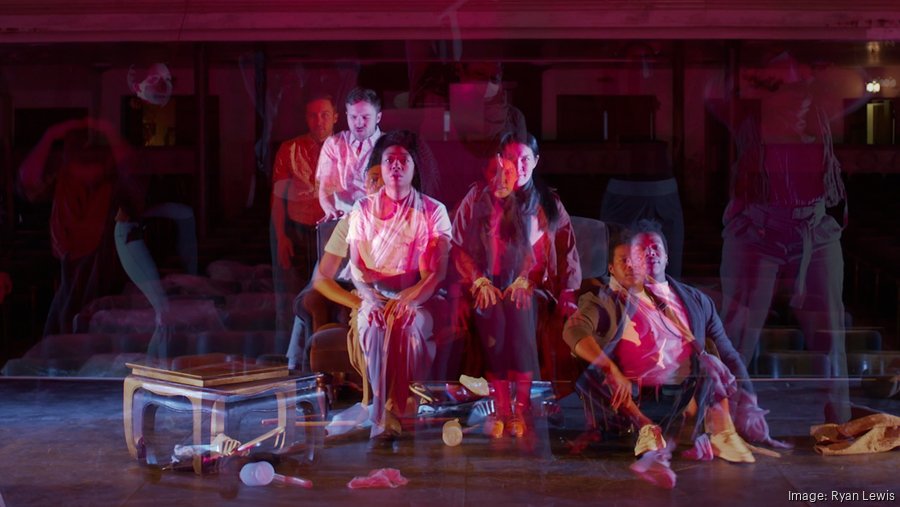Know Theatre was in the middle of a rolling world premiere run of a highly regarded new play, and preparing for its signature event, Fringe Festival, when the word came down: In-person gatherings were suspended because of a new, highly contagious virus spreading across the country.
Live, in-person theater was no longer possible. But for how long?
Rather than simply write off the rest of the season, artistic director Andrew Hungerford turned his team of play producers into filmmakers, negotiated new rules with the actors union and declared the show must go on – online, that is.
More than a year later, the innovative Over-the-Rhine theater company, now in its 23rd season, has plowed forward with its mission of producing cutting-edge theater, doing so digitally, and is preparing for a largely digital Fringe, its annual, two week-long festival of short, obscure and edgy plays.
In the process, the not-for-profit company has earned enough to stay in business (with some help from government relief programs), maintain a full schedule of plays and explore alternative ways of bringing new works of theater to its audiences.
When the shutdown orders were issued in March 2020, Hungerford knew the company had to keep working to survive. Without much in the way of cash reserves, Know Theatre is like a proverbial shark.

“If we stop swimming, we die,” Hungerford said. “We knew that we had to keep producing. We weren’t going to lay anyone off. We wanted to make sure everyone continued to be employed and kept their health insurance throughout the course of the pandemic.”
When the shutdown began, Know was in the middle of a four-week run of “Alabaster,” a Pulitzer Prize-nominated work that was being performed for the first time simultaneously at Know and 10 other theaters across the U.S.
Hungerford immediately began thinking of ways to continue with the production. “Can we perform it live for an empty theater and live stream it somehow?” he thought. “Can we record it and broadcast it?”
Complicating matters was the theater’s contract with Actors Equity Association, the labor union that represented the play’s two lead actors (as well as more than 50,000 other theater professionals across the country.) Equity consented to a special work agreement that allowed a performance to be recorded and made available online as video on demand for two weeks.
The company invested in cameras and other video equipment, and fortunately had a technical director with some experience in corporate video production, and three other employees, including Hungerford, who had experience “of varying degrees” in video editing.
“We did it entirely with our in-house team,” Hungerford said. “We did it for very low cost and were able to turn it around very quickly.”
Know charged $20 to watch the video, and the digital sales allowed the company to more than make up for the loss of in-person sales, as the play ended up performing better than originally expected at the box office.
Know then pivoted to an all-online version of Fringe, usually a celebratory festival of nearly two weeks featuring live theater in a variety of venues around Over-the-Rhine. Hungerford and staff reached out to the playwrights and artists who had already confirmed their participation to ask if they had a recording of their show, or could make one.
They responded, and the 2020 version of Fringe featured about 25 shows, some live-streamed, some recorded, and some that were recordings from previous years, shows that were called “Fringe Flashbacks.”
To maintain some of the communal feel of the festival, Know arranged for live “talkbacks” with artists after the shows were viewed, events that were streamed on its Facebook pages and its website.
Fast forward to the current season, which began in summer 2020, and Know’s first show was “Feast,” a riff on the Beowulf legend that was originally written to be performed at a banquet where the audience is dining together. The virus nixed those plans, so “Feast,” a solo show, was presented online.
Next up was “Fannie Lou Hamer, Speak On It,” a 45-minute production that was performed on the back of a pickup truck at community centers around the region, and live-streamed once.
The current production, “Theatre: A Love Story,” is available until March 27 as a prerecorded production.
This year’s Fringe Festival, scheduled for June 4-19, will be a combination of live-streamed performances, prerecorded videos and some in-person productions at outdoor venues.
Going digital has kept Know Theatre alive, but its audience and box office revenue is down a little more than 20% from what it would normally be, Hungerford said. Local and federal relief grants, as well as individual donations, have helped fill the revenue gap to meet an annual budget of just under $700,000.
This season was given the theme “We Can Rebuild It,” and the pandemic experience delivered lessons in new ways to present and sustain theater that the company will use as it emerges from the pandemic.
“We are questioning the assumptions of theater that have been passed down over the last couple of decades,” Hungerford said. “What can we do to question that conventional wisdom and build processes that are kinder to artists and more supportive of artists, and more realistic about how life works?”
ABOUT KNOW THEATRE
Founded: 1997 in Gabriel’s Corner, a community performance space in an Over-the-Rhine church basement.
Based: 1120 Jackson St. in OTR, since 2006.
Current production: “Theatre: A Love Story” is available through March 27 as a prerecorded production.
Tickets: $20; its “living wage ticket” is $30 (to help provide for actors and other theater professionals)
Information: knowtheatre.com
